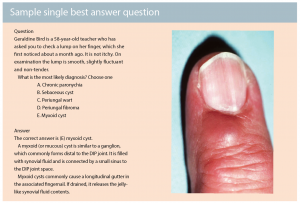The AKT tests what a candidate “knows”, so it pays to study hard and get it right first go
The Applied Knowledge Test (AKT) is a straightforward test with no tricks, yet many candidates struggle with it.
The exam focuses on common and serious diagnoses. In the 2016.1 exam cycle, the pass rate was about 64%.
As with the other exams, is seems the more times you attempt the AKT, the lower your chance of passing. For those sitting four or more times the pass rate is a low 17%. So it pays to study hard and get it right first go.
The AKT aims to test the “Knows” part of a candidate’s competency.
This rests at the base of Miller’s pyramid of “Knows”, “Knows how”, “Shows” and “Does”
(See below).
FORMAT
The four-hour exam comprises 150 questions – 70 Single Best Answer questions and 80 Extended Matching questions.
Importantly, this means you have one minute and 36 seconds per question with no negative marking, so answer every question.
It is important to pace yourself. There is no point getting 90% in 75% of the paper, and 0% for the last 25% of the
paper.
SINGLE BEST ANSWER QUESTIONS
Single Best Answer questions are made up of a clinical stem – a clinical scenario followed by a question – and five options for the answer.
You choose the “single best” answer.
To perform well on this test, you need both a good knowledge base and a good MCQ technique.
•Read the question very carefully
•Keep in mind that answers such as “always” and “never” are less likely to be correct
•Notice words like: “least”, “most”, “not”, “important”, “likely” and “except”. Many marks can be lost when candidates give the right answer to the wrong question.
There will not be four incorrect answers and one correct answer; rather there is one “best fit” answer. Use a process of elimination to find the most likely answer.
EXTENDED MATCHING QUESTIONS
Extended matching questions are made up of a clinical stem, followed by a question and then up to 26 options.
There will often be a “cluster” of questions with variations on a presenting problem or theme with the same list of choices, for example, three questions in a row on headaches, but different scenarios in the stem.
Try to make a mental diagnosis before looking at the options list.
WHY DO CANDIDATES FAIL?
In the view of Medcast medical educators, the most common reasons candidates fail the AKT are:
1.Didn’t study widely enough
2. Didn’t have a systematic approach to studying
3. Didn’t use correct resources
4. Didn’t work on weaknesses
5. Didn’t cover Australian specific themes – i.e. Aboriginal health and rural Australia issues
6. Didn’t know how to write a care plan
7. Didn’t think about the “other” stuff – i.e. statistics, legal issues, Medicare MBS
8. Didn’t have a study plan – too disorganised – missed topics
9. Didn’t keep to time on the day
10. Wasn’t familiar with exam format
11. Didn’t read the questions properly
12. Panicked on the day
13. Too blasé about the whole process
14. Didn’t do practice exam questions
15. Didn’t think about issues pertaining to general practice
HOW TO PREPARE
Put together a study timetable. Use something like the Wentwest study grid to guide your preparation. This lists the BEACH weighted topics that will be covered in the exam.
Give yourself time to prepare. You can’t get ready in the last month before the exam.
At a minimum, focus on:
• Murtagh
• All CHECKs in last three years
• AFP last two years
• Australian guidelines, especially RACGP
• Therapeutic guidelines
Medcast has a free sample course of exam practice questions. To test your knowledge with current exam-style questions, go to: medcast.com.au/courses
Dr Stephen Barnett is a GP Supervisor, Medical Educator, GP academic and Medical Director of Medcast



